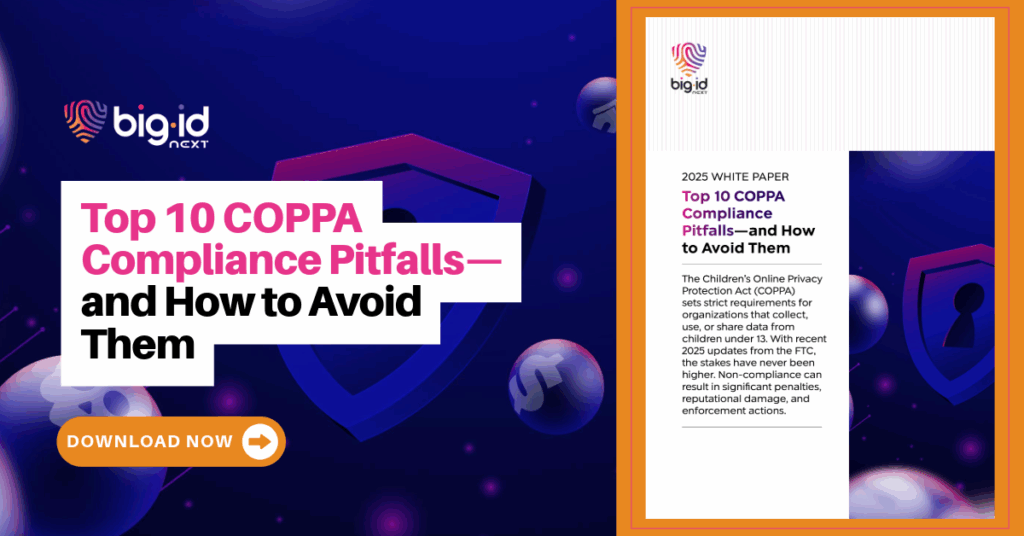The Children’s Online Privacy Protection Act (COPPA) sets strict requirements for organizations that collect, use, or share data from children under 13. With recent 2025 updates from the FTC, the stakes have never been higher. Non-compliance can result in significant penalties, reputational damage, and enforcement actions.
Here are the top 6 COPPA compliance challenges—and how BigID can help you overcome them.
1. Failing to Obtain Verifiable Parental Consent (VPC)
Challenge
One of the most common—and costly—COPPA compliance failures is not obtaining verifiable parental consent (VPC) before collecting personal information from children under 13. The FTC requires that companies use approved methods to confirm a parent’s identity and explicitly authorize data collection, particularly for non-essential purposes like targeted advertising or third-party analytics. Relying on passive consent (e.g., “click to agree”) or bundling consent into general terms of service is insufficient. Without a proper VPC process, businesses expose themselves to legal enforcement, reputational damage, and significant fines. Scalable, automated consent workflows with full audit trails are essential to meet this core requirement of COPPA.
Solution
BigID can correlate data to a specific child to ensure consent is captured with verifiable parental consent (VPC) workflows for practical validation from parents for collecting and processing children’s data.
2. Retaining Data Longer Than Necessary
Challenge:
Retaining children’s data longer than necessary is a key COPPA compliance risk, especially under the FTC’s 2025 updates, emphasizing strict data minimization and secure disposal requirements. Many organizations lack clear retention policies, leading to indefinite storage of sensitive information “just in case,” often across siloed systems and shadow data environments. This violates COPPA and increases the risk of data breaches and regulatory penalties. To comply, businesses must define clear retention timelines based on the specific purpose of collection, enforce automatic deletion when that purpose is fulfilled, and document the process for audit readiness. Failing to do so signals poor data governance and undermines the protections COPPA was designed to ensure.
Solution:
BigID helps organizations enforce compliant data lifecycle management by automatically identifying children’s data across all systems, applying automated policy-driven retention and deletion rules to remove stale or unnecessary data and records exceeding defined time limits.
3. Overlooking Biometric Data Protections
Challenge:
Overlooking biometric data protections is an increasingly serious COPPA compliance gap, especially with the 2025 rule updates explicitly expanding the definition of personal information to include biometric identifiers like facial recognition, voiceprints, and fingerprints. Many organizations collect biometric data unintentionally through voice-enabled devices, facial filters, or video uploads without recognizing the regulatory implications. Failing to treat this data with heightened safeguards, obtain explicit parental consent, or disclose its use in a privacy policy exposes companies to significant liability. As biometric technologies become more embedded in child-focused apps and platforms, businesses must proactively identify, classify, and control biometric data to meet COPPA’s expanded requirements and avoid enforcement action.
Solution:
BigID discovers and classifies children’s personal and sensitive data, including identifiers, biometric, and geolocation data, to ensure it is managed according to regulatory requirements.
4. Inadequate Security Controls for Child Data
Challenge:
Inadequate security controls for children’s personal data present a serious compliance risk under COPPA, especially with the 2025 update requiring a formal, written data security program. Many organizations underestimate the sensitivity of child data and fail to implement appropriate technical, administrative, and physical safeguards. Weak access controls, unencrypted storage, lack of breach detection, and poor third-party oversight can all lead to unauthorized access or data leaks, violating COPPA’s core protections. Given the heightened duty of care for underage users, businesses must proactively assess risks, secure data environments, and document security measures. In today’s regulatory climate, insufficient protection of children’s data isn’t just a vulnerability—it’s a violation.
Solution:
BigID enables organizations to identify vulnerabilities, detect unauthorized access, and enforce protective controls to improve security posture. BigID also supports incident response planning and audit-ready reporting, ensuring you meet COPPA’s security requirements.
5. Mishandling DSARs (Data Subject Access Requests)
Challenge:
Mishandling Data Subject Access Requests (DSARs) under COPPA can quickly put organizations in violation of the law and erode parental trust. COPPA grants parents the right to review, correct, or delete their child’s personal information, but many companies lack the infrastructure to handle these requests efficiently or securely. Common pitfalls include delayed responses, incomplete data retrieval, insecure delivery methods, and poor identity verification. As DSAR volume increases with heightened privacy awareness and regulatory enforcement, manual processes and siloed systems can’t keep up. Organizations must implement automated, end-to-end DSAR workflows that verify identity, locate data across environments, and deliver responses promptly and securely to stay compliant.
Solution:
BigID helps streamline and automate the entire DSAR process, ensuring fast, accurate, and secure fulfillment from intake and identity verification to locating a child’s data across all systems, redacting sensitive information, and securely delivering responses to confidently meet COPPA’s parental rights requirements.
6. Failing to Monitor Third-Party Data Sharing
Challenge:
Failing to monitor third-party data sharing is a significant and often overlooked COPPA compliance challenge. Many child-directed services integrate third-party tools, such as analytics, advertising SDKs, plug-ins, or cloud providers, without fully understanding how these vendors collect, use, or store children’s personal information. Under COPPA, primary operators ensure that all third parties handling children’s data comply with the law. Without proper oversight, organizations risk unauthorized data sharing, misuse of persistent identifiers, or unconsented tracking, each of which can trigger regulatory penalties. To avoid violations, businesses must maintain full visibility into data flows, vet third-party partners, and enforce strict contractual and technical controls to prevent unlawful data practices. Accountability doesn’t stop at your platform—it extends to every vendor you work with.
Solution:
BigID monitors and mitigates third-party risk with insights into vendor data activities and compliance status to ensure accountability and transparency across vendor relationships.
COPPA compliance is complex, especially with the expanded 2025 regulations. However, with the right tools and automation, organizations can protect children’s data, build user trust, and avoid costly enforcement actions. BigID gives you the visibility, control, and intelligence to stay compliant today and tomorrow.
Learn how BigID can help your team navigate COPPA compliance.


